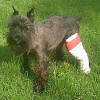Welcome to Otto's Story!
We thought we'd have a little fun with a photo essay of Otto's
journey from heartworm positive to heartworm free - but please read the
information at the end to understand how serious Otto's situation was. We
hope Otto will be a reminder to everyone to keep their own dogs on heartworm
preventative. Click here to read Otto's complete
diary.
Otto was picked up as a stray and taken into rescue in
September, 2002. Otto was given the standard testing all rescues receive -
including a heartworm test. Otto's came back positive. Being
"heartworm positive" means that Otto had been bitten by a mosquito carrying
heartworm larvae (most likely from another dog). Once the larvae were in
Otto's system they could have been killed off by a preventative such as
Heartguard or Interceptor. But poor Otto was not given any preventative.
In a few months, the larvae began to grow in his heart.
 Otto would need to
undergo a stressful treatment to kill the growing larvae. He also had some
serious infections that needed to cleared up before he could be treated.
When Otto finally began his treatment in December 2002, he had to be kept crated
and basically inactive for about 6 weeks. He was given several injections
to kill the worms in his heart.
Otto would need to
undergo a stressful treatment to kill the growing larvae. He also had some
serious infections that needed to cleared up before he could be treated.
When Otto finally began his treatment in December 2002, he had to be kept crated
and basically inactive for about 6 weeks. He was given several injections
to kill the worms in his heart.

So began Otto's time in the crate. It must have seemed
like a prison sentence! We can only imagine how confused and isolated Otto
must have felt.
Otto's activity had to be very limited, to avoid releasing the
dying heartworms and creating a potentially fatal clot. He had to be
carried up and down stairs and could only be slowly walked outside to go to the
bathroom.  Then
it was back to the crate.
Then
it was back to the crate.
Sometimes we joked that Otto had spent so much time in
isolation, he would need sunglasses when he could finally run free outside!
Finally the exciting day came when Otto's treatment was
complete. Now it was time to find the perfect home for a sweet dog that
had been through so much.


Thankfully, the response to Otto was overwhelming! Otto
was quickly adopted into a wonderful, loving home!
UPDATE from his family February 14, 2006
Today is the anniversary of the day we
picked up Otto right before the huge snowstorm of Valentine's weekend 2003. We
have had three great years with him and are hoping to enjoy him for yet a while
longer.
Just as an update, he has some type of
tumor growing in his skull which is very noticeable when you pet his head. We
have consulted with our vet and mutually decided that we will keep him as happy
and comfortable for as long as possible. He is still a loving wonderful
companion, although not quite as spunky as he was in the past.
We want to thank you again for the
Schnauzer rescue organization. Even if someone rescues an older dog or a dog of
unknown age there is nothing in the world like the joy our little guy has
brought to us. As you noted when we adopted him, he seemed to prefer men, and
Mike and Otto have walked countless miles together. Otto has had a wonderful
time trying to keep our yard squirrel free, although as a ground hunter he still
has no idea that they disappear UP the tree. It still irritates Otto that the
geese swimming in the middle of the pond don't fly away when he barks at them.
He forgets sometimes and starts to go in after them, then looks up with that
surprised look that says, "Schnauzers DON'T like water!" He is as loyal as can
be to his adopted family to the point of being fairly protective, but he
grudgingly accepts visitors after we insist that they are okay.
We just wanted to share a little on the day
we choose to celebrate his adoption day. He is our BEST Valentine!
Kind regards,
Mike and Jane
Thanks to everyone who has followed Otto's story and
contributed to his veterinary care!
Otto was only our first heart worm positive Schnauzer.
The story is always the same, all of them have come from shelters and would have
been euthanized if a rescue had not taken them and given them the life saving
treatment to make them heart worm free again. They spend 8 weeks being crated
and not being able to do anything but go outside briefly to go potty. They don't
understand why they are being treated that way.
Here are our heart worm positive dogs we have had in
rescue:
 Otto- 2002
Otto- 2002
 Rocky (he also
came with a broken leg)
Rocky (he also
came with a broken leg)
 Aaron
Aaron
 Checkers
Checkers
 Lil' Bit-2007
Lil' Bit-2007
 Lachlan-2010
Lachlan-2010
***************************************************************************
Here is some information about Heartworm disease - please
remember to keep your dog on heartworm preventative!
Heartworms have three major stages in their life: the adult stage, the
microfilaria and the infective larvae. Adult heartworms are full-grown
heartworms living in the heart and pulmonary arteries of the infected animal.
These cause most of the damage associated with heartworms by causing very small
blood clots which damage the lining of the blood vessels in this region. When
the blood pressure gets high enough, the heart can't work well and heart failure
starts. This is a slow process, usually taking a year or more to produce signs.
Microfilaria must be picked up by a mosquito and activated in the mosquito in
order to grow up. Once the mosquito has activated the microfilaria, it is
referred to as an infective larvae. The infective larvae are carried by a
mosquito from the dog it took blood from to the next dog it bites. They are
injected into the skin and begin a long migration to the heart region, which
takes about 5 months. During this time, they can be killed with little to no
effect on the dog through the use of heartworm preventative medications.
Heartworm medications can kill infective larvae up to about 50 days of age,
which is why most are given once a month. Newer medications have a longer
duration.
Heartworms cause dogs to die by causing small blood clots and embolisms
(including dead worms from natural death or from heartworm treatment). The blood
clots damage the lining of the large vessels leading to the lungs, eventually
causing enough scarring to lead to stiffness in the blood vessels and to
decrease the diameter of the interior of the vessel, eventually resulting in
heart failure.
When heartworms die they become embolisms. If enough of the lung blood
supply is obstructed by one of these clots, the dog dies. Heartworm treatment
increases the short term possibility of death in an affected dog, but is
literally the dog's only chance. The good news is the long term
prognosis is excellent - most dogs with heartworm disease will return to nearly
normal cardiovascular function within a few months after heartworm treatment.
Click on any of these topics for more details
Apply on Line | Foster Home Info.
| General Rescue Info.
Available Dogs |
On Line Store|
Volunteer |
Contact Us |
Rescue Links |
Humane Education |
Happy Endings
Schnauzer Gallery |
Great Rescue Stories
OUR
MAILING ADDRESS:
P.O. Box 5034 Laurel, MD 20725-5034
PHONE OR FAX: (301) 776-7370
E-MAIL
info@schnauzerrescue.net
**Schnauzer Rescue
of the Mid-Atlantic, Inc. is a non-profit organization under Internal Revenue Code section 501 (c)(3)**
The official registration and financial information of
Schnauzer Rescue of the Mid-Atlantic, Inc. may be obtained from
the Maryland Department of State. Registration does not imply
endorsement.

©2004
 Otto would need to
undergo a stressful treatment to kill the growing larvae. He also had some
serious infections that needed to cleared up before he could be treated.
When Otto finally began his treatment in December 2002, he had to be kept crated
and basically inactive for about 6 weeks. He was given several injections
to kill the worms in his heart.
Otto would need to
undergo a stressful treatment to kill the growing larvae. He also had some
serious infections that needed to cleared up before he could be treated.
When Otto finally began his treatment in December 2002, he had to be kept crated
and basically inactive for about 6 weeks. He was given several injections
to kill the worms in his heart. 
 Then
it was back to the crate.
Then
it was back to the crate.

 Otto- 2002
Otto- 2002


 Lil' Bit-2007
Lil' Bit-2007
